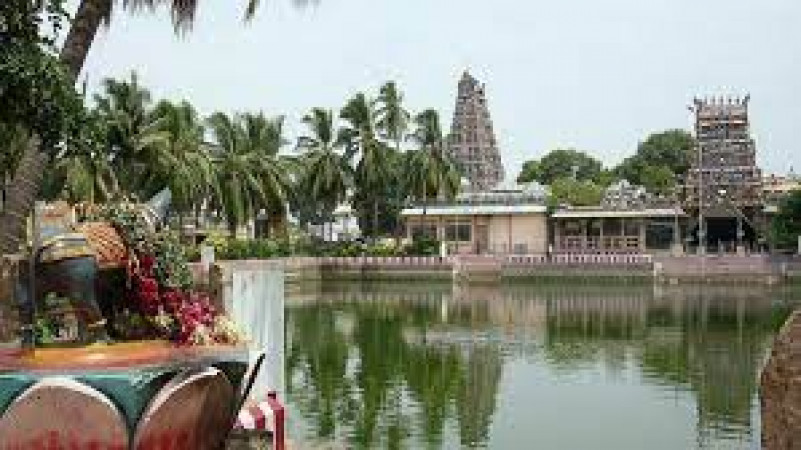
Pillaiyarpatti Travel Guide
Pillaiyarpatti is a small town located in the Sivaganga district of Tamil Nadu, India. Known for its famous Karpaka Vinayakar Temple, this destination holds immense historical and cultural significance. The town is named after the renowned Pillaiyar Temple, dedicated to Lord Ganesha. Pillaiyarpatti is famous for its intricate rock-cut cave temples, attracting devotees and history enthusiasts from around the world.Top Attractions in Pillaiyarpatti
- Karpaka Vinayakar Temple
- Pillaiyarpatti Cave Temples
- Karaikudi Heritage Town
- Chettinad Palace
- Kundrakudi Murugan Temple
Pillaiyarpatti is Famous for
Rock-cut Cave TemplesTop Attractions in Pillaiyarpatti
- Explore the ancient rock-cut cave temples
- Witness the grandeur of Karpaka Vinayakar Temple
- Experience the rich cultural heritage of Karaikudi
- Indulge in traditional Chettinad cuisine
- Seek blessings at Kundrakudi Murugan Temple
What's Great about Travelling to Pillaiyarpatti?
- Perfect destination for history buffs and spiritual seekers
- Offers a serene and peaceful environment for relaxation
- Authentic South Indian cultural experience
What's Not So Great about Travelling to Pillaiyarpatti?
- Limited accommodation options
- Remote location with limited transportation facilities
- May not be suitable for travelers seeking a bustling city experience
Travel Tips for Pillaiyarpatti
- Check temple timings before visiting for darshan
- Respect the local customs and traditions
- Carry sufficient cash as ATMs may be limited
Important Pillaiyarpatti trip information
- Ideal Duration: 1-2 days
- Best Time to Visit: October to March
- Nearby Airports and Railway Stations: Madurai Airport and Karaikudi Railway Station
FAQ's on Pillaiyarpatti
Q1: What is the best time to visit Pillaiyarpatti?
The best time to visit Pillaiyarpatti is during the winter months from November to February when the weather is pleasant and ideal for exploring the attractions. This period also coincides with the festival season, offering a vibrant cultural experience. Avoid the monsoon season from June to September due to heavy rainfall that may disrupt travel plans.
Q2: Do I need a visa to travel to Pillaiyarpatti?
Tourists visiting Pillaiyarpatti generally do not require a visa for short stays, but it is advisable to check the specific visa requirements based on your nationality. Some countries may have visa exemptions or visa-on-arrival facilities for tourism purposes.
Q3: What are the must-visit attractions in Pillaiyarpatti?
Some of the must-visit attractions in Pillaiyarpatti include the Pillaiyarpatti Karpaga Vinayagar Temple known for its ancient rock-cut temple architecture, the Thirumayam Fort offering panoramic views, and the Chettinad region for its unique heritage mansions and culinary delights.
Q4: Is Pillaiyarpatti a safe place to travel?
Pillaiyarpatti is generally considered safe for tourists. However, like any destination, it is advisable to stay cautious, especially in crowded areas and to take necessary precautions to safeguard belongings. Avoid isolated areas at night and follow basic safety guidelines.
Q5: What is the local currency in Pillaiyarpatti and can I use credit cards?
The local currency in Pillaiyarpatti is the Indian Rupee (INR). While credit cards are accepted in some hotels, restaurants, and larger establishments, it is advisable to carry cash for smaller transactions. ATMs are readily available in urban areas for convenient access to money.
Q6: What is the local cuisine like in Pillaiyarpatti?
Pillaiyarpatti offers a diverse culinary experience with traditional South Indian dishes like dosa, idli, and sambar being popular choices. Don't miss trying Chettinad cuisine known for its flavorful spices and unique cooking techniques. Vegetarian options are widely available, but meat dishes are also part of the local cuisine.
Q7: What transportation options are available in Pillaiyarpatti?
Transportation options in Pillaiyarpatti include buses, taxis, auto-rickshaws, and rental cars. Public buses are a cost-effective way to travel within the region, while taxis and auto-rickshaws offer convenient point-to-point transportation. Rental cars are ideal for exploring the area at your own pace.
Q8: Are there any cultural norms or etiquette I should be aware of when visiting Pillaiyarpatti?
When visiting Pillaiyarpatti, it is important to respect local customs such as removing shoes before entering temples, dressing modestly, and seeking permission before taking photographs. Greeting locals with a "Namaste" is appreciated, and it is customary to accept or offer items with the right hand as a sign of respect.
Q9: I am a travel agent. How can I buy travel leads of Pillaiyarpatti?
Register yourself as a travel agent at agents.tripclap.com and then you can buy travel leads to Pillaiyarpatti once your account is approved. For more details contact our support team at +91-8069186564 or support@tripclap.com
